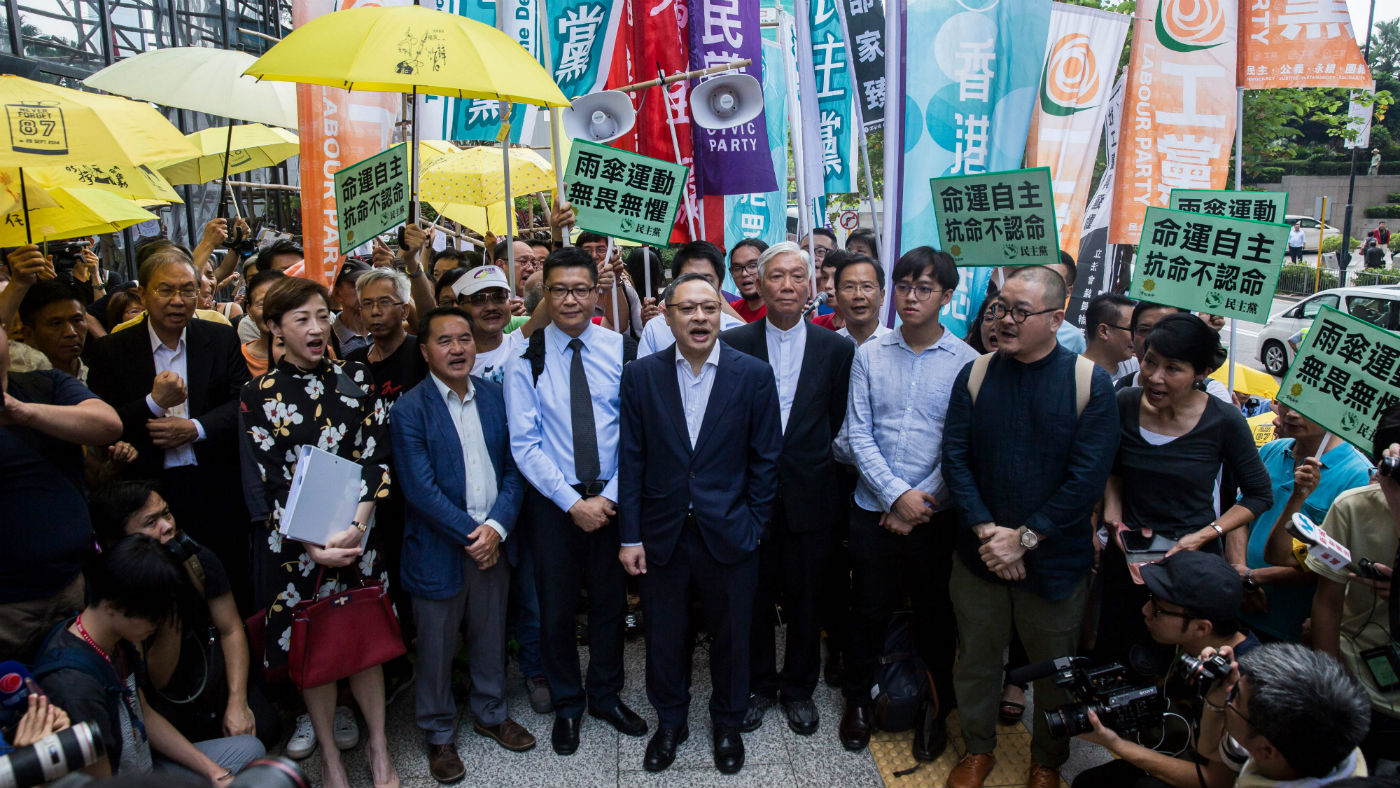Hong Kong ‘Occupy’ activists found guilty
Nine leaders of the 2014 pro-democracy movement convicted of public nuisance in landmark verdict on free speech

A free daily email with the biggest news stories of the day – and the best features from TheWeek.com
You are now subscribed
Your newsletter sign-up was successful
Nine leaders of Hong Kong’s 2014 pro-democracy Occupy movement have been found guilty of public nuisance in a landmark trial which threatens long-standing freedoms in the Chinese-controlled city.
The protests, which took their name from the anti-austerity Occupy movements that gripped the west in 2011, aimed to bring fully democratic elections to the semi-autonomous Chinese territory.
They later developed into a mostly peaceful 79-day shutdown of the commercial district of Hong Kong known as the “umbrella movement”, after the umbrellas used by supporters to fend off pepper spray from the police.
The Week
Escape your echo chamber. Get the facts behind the news, plus analysis from multiple perspectives.

Sign up for The Week's Free Newsletters
From our morning news briefing to a weekly Good News Newsletter, get the best of The Week delivered directly to your inbox.
From our morning news briefing to a weekly Good News Newsletter, get the best of The Week delivered directly to your inbox.
It represented the biggest public challenge to Beijing’s authority since the 1989 Tiananmen Square protests, and the subsequent crackdown made international celebrities of the movement’s leaders.
Leaders of the student groups, including Joshua Wong and Nathan Law, were sentenced to up to eight months in jail in 2017 for storming a government compound. Nine more have now been found guilty, with Law professor Benny Tai, retired sociologist Chan Kin-man, and retired pastor Chu Yiu-ming facing up to seven years in prison for public nuisance offences.
According to Al Jazeera “prosecutors had relied on media interviews to build their case”, including a press conference in 2013 where the movement's co-founders announced the campaign “Occupy Central with Love and Peace”. The event was termed a “public manifestation” of the activists' conspiracy to commit the crimes by the prosecutors.
While widely anticipated, the ruling has nevertheless been seized upon by opponents of the regime as evidence of the further erosion of freedoms in the former British territory.
A free daily email with the biggest news stories of the day – and the best features from TheWeek.com
Reuters reports that “since the city returned to Chinese rule in 1997, critics say Beijing has reneged on its commitment to maintain Hong Kong’s high degree of autonomy and freedoms under a co-called 'one country, two systems' arrangement”.
The last Governor of Hong Kong, Lord Patten, called Tuesday’s ruling “appallingly divisive”, while Maya Wang, senior China researcher at Human Rights Watch said that “Hong Kong courts, by labelling peaceful protests in pursuit of rights as public nuisance, are sending a terrible message that will likely embolden the government to prosecute more peaceful activists, further chilling free expression in Hong Kong”.
The protests have been followed by “a long stretch of frustration and defeat for pro-democracy activists”, The New York Times says.
Hong Kong’s leader at the time, Leung Chun-ying, refused to step down, though he did not seek another term in 2017. Lawmakers rejected a proposal that would have allowed Hong Kong voters to directly elect their leader, known as the chief executive, but only from a slate of candidates approved by a pro-establishment election committee.
The Financial Times also reports that “several dozen other democracy activists have been imprisoned or are facing trials related to the protests and wider democracy movement they spawned”.
The paper adds that “the government has also removed outspoken lawmakers from Hong Kong’s partially elected Legislative Council, issued an unprecedented ban on a pro-independence political party and effectively expelled a senior Financial Times editor”.
-
 The environmental cost of GLP-1s
The environmental cost of GLP-1sThe explainer Producing the drugs is a dirty process
-
 Greenland’s capital becomes ground zero for the country’s diplomatic straits
Greenland’s capital becomes ground zero for the country’s diplomatic straitsIN THE SPOTLIGHT A flurry of new consular activity in Nuuk shows how important Greenland has become to Europeans’ anxiety about American imperialism
-
 ‘This is something that happens all too often’
‘This is something that happens all too often’Instant Opinion Opinion, comment and editorials of the day
-
 Epstein files topple law CEO, roil UK government
Epstein files topple law CEO, roil UK governmentSpeed Read Peter Mandelson, Britain’s former ambassador to the US, is caught up in the scandal
-
 Iran and US prepare to meet after skirmishes
Iran and US prepare to meet after skirmishesSpeed Read The incident comes amid heightened tensions in the Middle East
-
 Israel retrieves final hostage’s body from Gaza
Israel retrieves final hostage’s body from GazaSpeed Read The 24-year-old police officer was killed during the initial Hamas attack
-
 China’s Xi targets top general in growing purge
China’s Xi targets top general in growing purgeSpeed Read Zhang Youxia is being investigated over ‘grave violations’ of the law
-
 Panama and Canada are negotiating over a crucial copper mine
Panama and Canada are negotiating over a crucial copper mineIn the Spotlight Panama is set to make a final decision on the mine this summer
-
 Why Greenland’s natural resources are nearly impossible to mine
Why Greenland’s natural resources are nearly impossible to mineThe Explainer The country’s natural landscape makes the task extremely difficult
-
 Iran cuts internet as protests escalate
Iran cuts internet as protests escalateSpeed Reada Government buildings across the country have been set on fire
-
 US nabs ‘shadow’ tanker claimed by Russia
US nabs ‘shadow’ tanker claimed by RussiaSpeed Read The ship was one of two vessels seized by the US military